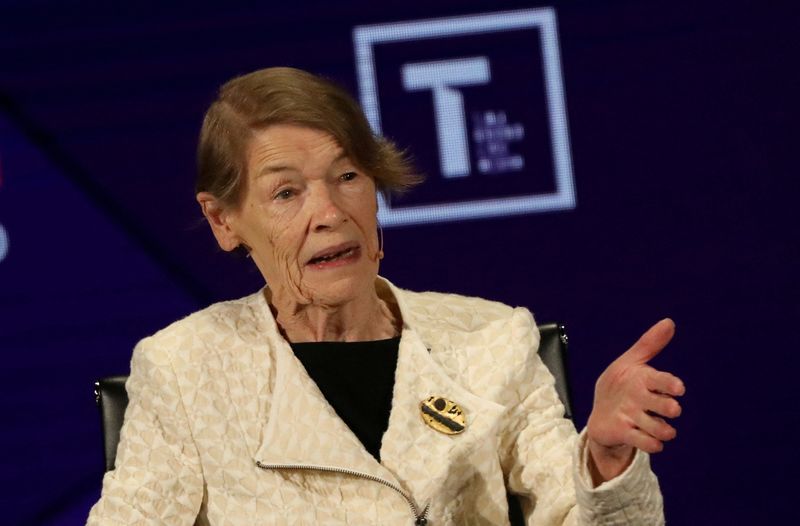Glenda Jackson, British actor turned politician, dies aged 87
2023.06.15 08:52

© Reuters. FILE PHOTO: Actor and politician Glenda Jackson speaks on stage at the Women In The World Summit in New York, U.S, April 12, 2019. REUTERS/Brendan McDermid/File Photo
LONDON (Reuters) – Actor Glenda Jackson, a two-time Oscar winner who won acclaim for playing an English queen but later served as a socialist politician in the British parliament for 23 years, has died. She was 87.
One of four daughters of a bricklayer and a cleaning lady in northwest England, Jackson never forgot her roots even as she made her name as one of the greatest women actors of her generation.
Raw-boned, pallid and angular, with striking, sharp eyes, she had starred on stage, television and film before quitting to take up politics, declaring: “An actor’s life is not interesting”.
She won her first Academy Award in 1971 as lead actress for her role as a headstrong artist in director Ken Russell’s film of D.H. Lawrence’s novel “Women in Love”.
Her second Oscar came three years later for “A Touch of Class”, a romantic comedy directed by Melvin Frank in which Jackson played a harried fashion designer caught up in a catastrophic love affair with an American businessman in London.
Jackson also won two Emmy awards for her portrayal of England’s Queen Elizabeth I in the BBC’s 1971 television series “Elizabeth R”.
Growing up in Birkenhead, Cheshire, Jackson left school at the age of 15 and found work in a shop before winning a place at the prestigious Royal Academy of Dramatic Art in London.
Her big chance came in 1964 when avant-garde director Peter Brook chose her to play Charlotte Corday in his stage production of ”Marat/Sade”, set in a lunatic asylum.
When she repeated her performance on Broadway, American critics voted her the most promising newcomer of the 1965-66 season. She went on to consolidate her reputation by playing Ophelia in William Shakespeare’s “Hamlet” and Masha in Anton Chekhov’s “Three Sisters”.
Her performances began to attract the attention of film directors. As well as “Women in Love” and “A Touch of Class”, other notable film roles included John Schlesinger’s “Sunday Bloody Sunday” with Peter Finch.
She also portrayed Elizabeth for a second time in “Mary, Queen of Scots” opposite Vanessa Redgrave in the title role.
After more than three decades on stage and film, Jackson quit acting and took her no-nonsense, straight-talking style into politics.
She had been angered by the damage she believed was inflicted on the working classes by Margaret Thatcher, Britain’s Conservative prime minister from 1979 until 1990.
In 1992, at the age of 55, Jackson won a seat in parliament representing the left-of-centre Labour Party in a constituency in north London.
“We must work for the poor, the homeless, the unemployed, the frail, the sick,” she told supporters.
In parliament, Jackson was vociferous in her condemnation of the Conservative Party which she accused of instilling a dreadful, dreadful moral malaise” in Britain.
When Labour won power in May 1997, and Jackson retained her seat, Prime Minister Tony Blair appointed her as a junior minister responsible for transport in London.
She held the position for two years before resigning to make an ultimately unsuccessful attempt to be nominated as Labour’s candidate for London Mayor.
Though she remained in parliament, securing re-election in 2001, 2005 and 2010 and fighting for equality, she became increasingly out of step with Blair’s more centrist approach and decided in 2011 not to contest the next election.
“I will be almost 80 and by then it will be time for someone else to have a turn,” she said.
She returned to acting in 2015 and the following year won critical acclaim for playing King Lear (NYSE:) on stage. In 2018, she played 92-year-old A in Edward Albee’s “Three Tall Women” on Broadway, a performance that won her a prestigious Tony Award.
In 2019, she played an elderly grandmother struggling with dementia in “Elizabeth Is Missing”, a television series, and was rewarded with a British Academy of Film and Television Arts (BAFTA) TV Award for Best Actress.
Jackson was married from 1958 to 1976 to stage director Roy Hodges. She is survived by their son, Daniel Hodges, who was born in 1969.








